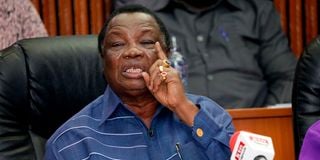Cotu blames IMF for weak shilling, economic decline

Central Organisation of Trade Unions Secretary-General Francis Atwoli gestures while addressing journalists at the union’s head office in Nairobi on January 24, 2024.
The umbrella body of Kenya's workers' unions has raised concerns over the government’s dalliance with the International Monetary Fund (IMF), blaming the multilateral lender for the dramatic fall of the Kenyan shilling.
The Central Organisation of Trade Unions (Cotu) blames the IMF for introducing tough conditions to the government to extend more funding to Kenya. The union says these conditions have raised the cost of living and contributed to the depreciation of the local currency.
Addressing journalists in Nairobi on Wednesday, the labour movement, following a meeting of its affiliate members, warned that the country was returning to the economic difficulties witnessed in the 80s and 90s, during the infamous Structural Adjustment Programmes.
Cotu Secretary-General Francis Atwoli claimed the devaluation of the Kenyan shilling was “on the recommendation of the IMF and World Bank.”
The weak shilling, Mr Atwoli lamented, had diluted the purchasing power of workers as well as their savings. He noted that the value of the shilling had dropped from exchanging at 120.42 units against the US dollar in September 2022 to above 160 units.
He accused Treasury Cabinet Secretary Njuguna Ndung’u and Central Bank of Kenya Governor Kamau Thugge of pandering to the IMF. Cotu also cautioned the government against continued heavy borrowing, including from the multilateral lenders.
Kenya’s public debt hit Sh8.6 trillion by September last year and the government plans to borrow Sh861 billion during the year ending June, based on projections from the Treasury.
“Considering this increase [in public debt], and given that the government is continually borrowing to pull itself out of the cash crunch, things are not looking good,” said Mr Atwoli.
Cotu has raised the concerns just a week after the IMF released about Sh150 billion, following the conclusion of the sixth review of the Extended Fund Facility and Extended Credit Facility (ECF/EFF) programme, bringing to $2.6 billion (about Sh416 billion) the total amount Kenya has so far received from the multilateral lender since launch of the programme in April 2021.
The programme was originally planned to end this year but was extended by 10 months in July last year, to now end in April 2025. The IMF has been behind most of the changes the government has implemented on public finances, mainly newly introduced as well as additional taxes, since the start of the programme.
The IMF had also criticised the government’s fuel subsidy programme that President William Ruto’s government scrapped soon after he was sworn into office last year and supported the raising of the Value Added Tax on petroleum products from eight percent to 16 percent, which was implemented since July 2023.
The IMF is also behind the pressure for restructuring of several State corporations, mainly Kenya Power and Kenya Airways, and continued to note in its latest report the need to wean them off Exchequer support.
“Kenya’s performance under the ECF/EFF arrangements has been mixed with adherence to quantitative targets being broadly satisfactory. The authorities have made welcome progress in some key areas, including governance and public financial management," said Ms Antoinette Sayeh, IMF’s Deputy Managing Director and Acting Chair to the Executive Board..
"Continued implementation of corrective measures to address missed targets and accelerated reforms will be important,” Ms Sayeh added.






